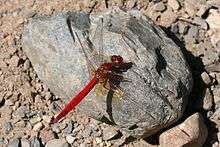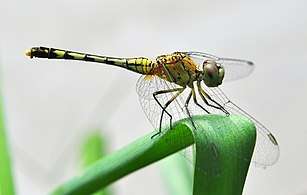Diplacodes
Diplacodes is a genus of dragonflies in the Libellulidae family.[2] They are commonly known as perchers. Their colours range from the totally black body of the African Diplacodes lefebvrii, the lovely pale blue of India's Diplacodes trivialis, to the intense red of the Asian–Australian Diplacodes haematodes.
| Perchers | |
|---|---|
 | |
| Male scarlet percher | |
| Scientific classification | |
| Kingdom: | Animalia |
| Phylum: | Arthropoda |
| Class: | Insecta |
| Order: | Odonata |
| Infraorder: | Anisoptera |
| Family: | Libellulidae |
| Genus: | Diplacodes Kirby, 1889[1] |
Various species of this genus occur in Africa, Asia, Australia and the South West Pacific. They are generally small in size.
Species
The genus Diplacodes includes the following species:[3]
- Diplacodes bipunctata (Brauer, 1865) – wandering percher[4]
- Diplacodes deminuta Lieftinck, 1969 – little percher[5]
- Diplacodes exul (Selys, 1883)
- Diplacodes haematodes (Burmeister, 1839) – scarlet percher[4]
- Diplacodes lefebvrii (Rambur, 1842) – black percher[6]
- Diplacodes luminans (Karsch, 1893) – luminous percher, barbet, barbet percher[7]
- Diplacodes melanopsis (Martin, 1901) – black-faced percher[4]
- Diplacodes nebulosa (Fabricius, 1793) – charcoal-winged percher[4]
- Diplacodes pumila Dijkstra, 2006 – dwarf percher[8]
- Diplacodes spinulosa Navás, 1915
- Diplacodes trivialis (Rambur, 1842) – chalky percher,[4] ground skimmer[9]
_male.jpg) male Diplacodes sp, Madagascar
male Diplacodes sp, Madagascar Diplacodes trivialis, India
Diplacodes trivialis, India
gollark: I definitely haven't broken SHA256 over here.
gollark: As planned.
gollark: Yep, that checks out.
gollark: However, consider using my convention, maybe with hex instead of the arbitrary anomalous Unicode.
gollark: I see. I believe rock blunts scissors, and such none are safe.
References
| Wikimedia Commons has media related to Diplacodes. |
| Wikispecies has information related to Diplacodes |
- Kirby, W.F. (1889). "A revision of the subfamily Libellulinae, with descriptions of new genera and species". Transactions of the Zoological Society of London. 12: 249–348 [307] – via Biodiversity Heritage Library.
- "Genus Diplacodes Kirby, 1889". Australian Faunal Directory. Australian Biological Resources Study. 2012. Retrieved 27 February 2017.
- Martin Schorr; Dennis Paulson. "World Odonata List". University of Puget Sound. Retrieved 12 October 2018.
- Günther Theischinger; John Hawking (2006). The complete field guide to dragonflies of Australia. CSIRO Publishing. ISBN 0-643-09073-8.
- Clausnitzer, V.; Dijkstra, K.-D.B. & Suhling, F. (2009). "Diplacodes deminuta". IUCN Red List of Threatened Species. 2009. Retrieved 8 October 2010.CS1 maint: ref=harv (link)
- "Checklist, English common names". DragonflyPix.com. Archived from the original on 4 December 2012. Retrieved 5 August 2010.
- Clausnitzer, V.; Suhling, F. & Dijkstra, K.-D.B. (2009). "Diplacodes luminans". IUCN Red List of Threatened Species. 2009. Retrieved 8 October 2010.CS1 maint: ref=harv (link)
- Clausnitzer, V.; Clausnitzer, V. & Suhling, F. (2010). "Diplacodes pumila". IUCN Red List of Threatened Species. 2010: e.T168013A6442446. doi:10.2305/IUCN.UK.2010-3.RLTS.T168013A6442446.en.
- Subramanian, K. A. (2005). Dragonflies and Damselflies of Peninsular India (PDF).
This article is issued from Wikipedia. The text is licensed under Creative Commons - Attribution - Sharealike. Additional terms may apply for the media files.